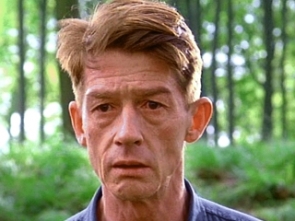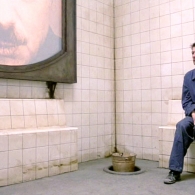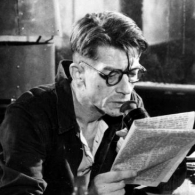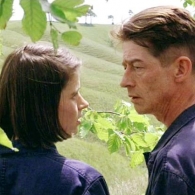
This main character is at the central point of the novel. Winston is a 39-year-old man who lives in Oceania and supports the ideology of gang. He works at the Ministry of Truth and proclaims the independence of the thoughts. Winston is separated and doesn’t have children. This aspect shows that he is not sociable and rather problem personality. As a protagonist, he is an integral part of a novel as he influences the destiny of other people and tries to improve the life of the citizens of Oceania. Smith cooperates with most of the personages of the novels, in particular, Charrington and O’Brien.
Winston Smith Photo Gallery
Winston Smith Quotes
Who controls the past controls the future. Who controls the present controls the past.
In the end the Party would announce that two and two made five, and you would have to believe it. It was inevitable that they should make that claim sooner or later: the logic of their position demanded it. Not merely the validity of experience, but the very existence of external reality was tacitly denied by their philosophy.
I think I exist. I am conscious of my own identity. I was born, and I shall die. I have arms and legs. I occupy a particular point in space. No other solid object can occupy the same point simultaneously.
Why should one feel it to be intolerable unless one had some kind of ancestral memory that things had one been different?
Do it to Julia! Do it to Julia! Not me! Julia! I don’t care what you do to her. Tear her face off, strip her to the bones. Not me! Julia! Not me!
Do you realize that the past, starting from yesterday, has been actually abolished? If it survives anywhere, it’s in a few solid objects with no words attached to them, like that lump of glass there. Already we know almost literally nothing about the Revolution and the years before the Revolution. Every record has been destroyed or falsified, every book rewritten, every picture has been repainted, every statue and street and building has been renamed, every date has been altered. And that process is continuing day by day and minute by minute. History has stopped. Nothing exists except an endless present in which the party is always right.
If the Party could thrust its hand into the past and say of this or that event, it never happened—that, surely, was more terrifying than mere torture and death?
Listen. The more men you’ve had, the more I love you. Do you understand that? I hate purity, I hate goodness! I don’t want any virtue to exist anywhere. I want everyone to be corrupt to the bones.
But the rocks are full of the bones of extinct animals—mammoths and mastodons and enormous reptiles which lived here long before man was ever heard of.
Winston Smith in the Essays
1984 Criticism
The 20th century has given the literary world a completely new genre – a dystopian novel. The main purpose of this genre is to envisage the ruthlessness of technological progress subdued by the government. Eric Arthur Blake, an English writer and journalist more famous under his pseudonym…
Symbolism in 1984
When it comes to symbolism, 1984 is treasurer full of symbols, allusions, and hints. But what is symbolism in the first place? This is a literary device which is used to hide a meaningful abstract idea behind an object, person, or a place. Implicit or explicit, symbols convey additional messages…
Censorship in 1984
According to George Orwell, the freedom of speech is an essential element that should be granted by any authorities. When people are deprived of the possibility to express their thoughts in whatever form they want, then consider that there is no freedom of speech at all. The same goes for…
Compare and contrast Brave New World and 1984
George Orwell’s 1984 and Aldous Huxley’s Brave New World are commonly classed together as distopian novels. The tenor of them are however markedly different, leading many commentators to find differences in their themes too. Some are even bold enough to suggest that Huxley’s vision of the future…
Conditioning, Persuasion and Propaganda in 1984 and Brave New World
Both Aldous Huxley’s Brave New World and George Orwell’s 1984 present an anti-utopian future, in which anything that might be validly equated with freedom has been destroyed. Although markedly different in many ways, these two books show a grim parallelism in their presentation of many of the ways…
Compare and Contrast: Brave New World and 1984
George Orwell’s 1984 and Aldous Huxley’s Brave New World are commonly classed together as distopian novels. The tenor of them are however markedly different, leading many commentators to find differences in their themes too. Some are even bold enough to suggest that Huxley’s vision of the future…
1984 Comparison to Brave New World
Esteban Poveda December 12 Mrs Suhr Mindless Robots It is interesting how individuals are those who make the greatest advances in mankind, yet it is human nature to want to be a part of something, to conform to those around them. Those who go against their basic instincts and think out loud are…
1984 Analysis of Winston Smith
Analysis of Winston Smith In the novel 1984 by George Orwell, Winston Smith is the protagonist. He is thirty-nine years old, frail, and thin. Winston is a common man that most of the readers can sympathize with. He is a man who wants to test the limits of the Party’s powers by seeing how many…
1984: Character Analysis of Winston Smith
Character Analysis Of Winston Smith Winston is the main character in this novel and he seems to be separated from all of the other characters in the book by his thoughts. It is Winston’s uncommon character that we see unfolding as we read through the novel. He seems to be the only one set apart…
1984 Winston Smith
Winston is the protagonist of the story, whose unsuccessful attempts at questioning and overthrowing the Party and Big Brother symbolize the defeat of humanity at the hands of socialism. Winston becomes de-humanized when his thoughts and emotions are controlled by the Party and when all his…
The Price of Freedom: An Analysis of Rebellion in George Orwell’s 1984
As a new society unfolds, so do new values and authority. In 1984, George Orwell presents a futuristic vision of the power of government as well as its social conventions. Primarily, Orwell uses Winston Smith to exhibit the effects that government control can have on morality. Winston lives in…
George Orwell’s 1984: Methods of Suppression in 1984. A study of ways people were oppressed in the book.
Methods of Suppression in 1984 George Orwell’s anti-utopian novel 1984 paints a picture of a society in which the individual has no freedom, hope, or feeling. Three super states called Oceania, Eurasia, and Eastasia, divide and ravage the earth with perpetual war between them. The story takes…
George orwell, “1984”
In George Orwell’s “1984”, Winston Smith and Julia live in Oceania, where their actions become a subversive force that the “Party” must control. Oceania, located in Europe, represents a totalitarian society in its purest form during the 1940s. Many aspects of Wilson’s and Julia’s daily life in…
George Orwell 1984
English George Orwell’s 1984 In the year of 1984, a man by the name of Winston Smith lives in London in the oppressive state of Oceania. No matter where he goes, he, as well as his fellow citizens are always being watched by the notorious “Big Brother. ” There are cameras everywhere that can watch…
Irony of George Orwell’s 1984
“The irony of a dystopia is, nasty and brutish as they are, they usually begin with the best of intentions” -Author Unknown Through the backdrop of a crumbling world, George Orwell is able to paint an image of human life in years to come, if the society he lives in continues the track it is on…
George Orwell 1984
George Orwell’s classic novel ‘Nineteen Eighty Four’ paints a bleak picture of a futuristic society controlled by a totalitarian government. 1984 is a novel about using power to control society. George Orwell’s novel was published in 1948 and this is significant because World War II had recently…
George Orwell 1984 Questions
1984 By George Orwell QuestionsJayson Papa 1. Re read pages 3-6 and describe the setting/atmosphere in your own words The first few chapters of 1984 are devoted to introducing the major characters and themes of the novel. These chapters also acquaint the reader with the harsh and oppressive world…
George Orwell’s 1984
George Orwell’s 1984 is one of the most famous novels of the negative utopian, or dystopian, genre. Unlike a utopian novel, in which the writer aims to portray the perfect human society, a novel of negative utopia does the exact opposite: it shows the worst human society imaginable, in an effort…

Author: Cody Owens




Leave a Reply